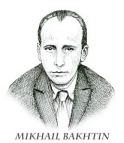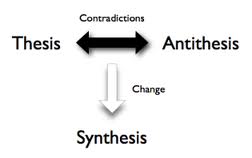Mentioning Jacques Derrida makes some academic’s ears spike up. Derrida is known to be notoriously wordy, painfully dense, and riddled with jargon in anything he writes. Regardless of the difficulties, he manages to reveal patterns in Western thought that dominate discourse. One particular trend, however, forms the crux of his criticisms — the binary system.
Throughout Western thought, arguments have been presented in dichotomies. Socrates framed his philosophy through discussion by conversing with another party which would argue the objecting point. With the work of philosopher Georg W. F. Hegel, we have given this a title. Dialectics, as it’s called, consists of a thesis and an antithesis with the hope of producing a synthesis. This triad has become the basis of our argumentative Western society.
However, the influence of the dialectic process goes much further than argumentation. The dichotomy has become so strong that we presumably view all ideology and ideas within a binary. These binaries can be either contradictory (dialectic) or supplementary to each other, but are always opposite in meaning. And one is always seen as more important than the other. Western binaries tend to be, as a rule, hierarchical and unequal. For Derrida, these relationships are important to understand to fully grasp theory or texts. It is equally important to undermine — or deconstruct — these relationships and maybe even, in some cases, try to break their authority to reach a grander conclusion.
Let’s take, for a moment, the actual binaries and their content.
B versus A
Whereas B is superior to A.
Good ¦ Bad
Mind ¦ Body
Reality ¦ Appearance
Self ¦ Other
Speech ¦ Writing
Man ¦ Woman
White ¦ People of Color
Bourgeois ¦ Proletariat
These binary distinctions are based on institutional conceptions. Taken a step further, we can examine their relationship. “A” is supplementary to the dominate “B.” Noted literary critic Barbara Johnson explains this relationship in an essay titled “Writing” from Critical Terms for Literary Study.
A is added to B.
A substitutes for B.
A is a superfluous addition to B.
A makes up for the absence of B.
A usurps the place of B.
A makes up for B’s deficiency.
A corrupts the purity of B.
A is necessary to that B can be restored.
A is an accident alienating B from itself.
A is that without which B would be lost.
A is that through which B is lost.
A is a danger to B.
A is a remedy to B.
A’s fallacious charm seduces one away from B.
A can never satisfy the desire for B.
A protects against direct encounter with B.
These observations are not absolute. Different Western binaries express different relationships with each other; these are not applicable to all, but each of the examples given can fit into a few of these criteria outlined.
We have established the fact that Western dichotomies can take on two forms: contradictory (dialectic) or supplementary. Generally, discussions tend to be dialectical while the binaries in individual ideologies tend to be supplementary. This trend in Western thought is crucial in understanding the nature of discourse and its development. Particularly in the United States, most political speak is phrased as two sides to an argument. The outcome of argumentation is generally one of the following three scenarios — no conclusion is made, one side is proved correct, or a fusion of both opinions. It would be a insult to call American politics dialectic in nature, since a synthesis is seldom reached, but the binary of opinion is still present. This creates the illusion of two options and the constant regurgitation of the “lesser of two evils” argument in every aspect of American politics. Of course, European politics is not two-party centered. However, the Western binary still applies. Seldom is the dialogue expanded beyond the back-and-forth format of mindless debate and bickering.
Perhaps it is time to expand the periphery. The endless “debate teams” on high school campuses, the lecturing model of education, is based on a two-person argument. Inherently competitive, it usually demands one party to be deemed victor in “beating” his opponent during a debate. In education, the victor is clear — the instructor is the power in charge of mediating opinion and presenting information. During formal debate, the victor is decided through vulgar verbal exercises. Whatever the case may be, dialogue has institutionally become synonymous with debate and heated competition which is a perversion of what it actually means.
 Dialogics is concept conceived by Russian philosopher Mikhail Bakhtin. It is seen as a methodology of dialogue that goes beyond dialectics. Rather than dialectics, where once ideology competes with another, dialogics is an alternative mode of discussion where many different ideas exist in the same space. There is no ideological closure afterwards and is aimed at progressing thought rather than resolving a contradiction. Bakhtin makes the argument that all thought is inherently dialogical. Nobody speaks in a vacuum — your language is based on what was said prior and the reaction it may create. Thereby, language is dynamic and perpetually redescribing the world. From this he concludes that dialogics has always existed as a phenomenon of speech.
Dialogics is concept conceived by Russian philosopher Mikhail Bakhtin. It is seen as a methodology of dialogue that goes beyond dialectics. Rather than dialectics, where once ideology competes with another, dialogics is an alternative mode of discussion where many different ideas exist in the same space. There is no ideological closure afterwards and is aimed at progressing thought rather than resolving a contradiction. Bakhtin makes the argument that all thought is inherently dialogical. Nobody speaks in a vacuum — your language is based on what was said prior and the reaction it may create. Thereby, language is dynamic and perpetually redescribing the world. From this he concludes that dialogics has always existed as a phenomenon of speech.
What can we create from a model of dialogical discourse? We can create cooperative learning environments. We can destroy hierarchy relationships in public forums and education. However, dialogics is not a substitute for a dialectic process of dialogue. They have different uses. The issue is, however, that we have given debate precedence. Likewise, we have given these restricting binaries precedence. The aim of dialogue is not a cut-and-throat solution. It is for the facilitation of free thought and new ideas. It is a space where prejudice is suspended and where individually freely converse. And the need for such a discussion model becomes more and more apparent as we realize that a standardized education model of lecturing is not a satisfactory one.






